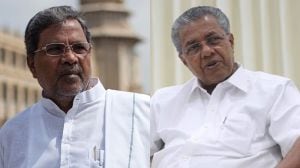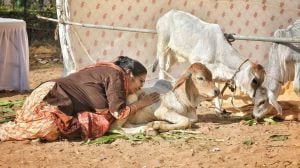Stuck in godhra tracks
Although the removal of POTA charges from the Godhra train carnage case following a Supreme Court verdict has brought relief for the accused...

Although the removal of POTA charges from the Godhra train carnage case following a Supreme Court verdict has brought relief for the accused, the case is still stuck where it was six years ago after the Sabarmati Express train was set ablaze at the Godhra railway station on February 27, 2002.
Trial in the case, in which 133 persons were made accused, is yet to start. As many as 17 absconders are yet to be nabbed and bail applications of most of the 82 accused are still pending in the Supreme Court. Also, the five accused who died in judicial custody will never know what the court had in store for them.
8220;So many related cases have sprung out of the Godhra case that the original case itself has seen no progress at all. The position of the accused is the same as it was in 2002 when most of them were arrested,8221; says advocate S H Iyer, who represents some of the accused in the case.
The case has been shuttling between different courts. Hearing in the case was first held before the Sessions Court, Godhra. Then the case was sent to the designated POTA court in Ahmedabad. After that, the case was sent to the Gujarat High Court, and from there to the Supreme Court.
On March 7, 2003, the Gujarat Government had set up a Special POTA Court in Ahmedabad, and the Godhra case was rechristened as POTA case no. 1. Around the same time, a State Level Committee SLC, a mandatory body under POTA, was formed to hear representations made by the accused. But before the SLC could pronounce its decision, POTA was repealed by the Central Government on October 21, 2004. This resulted in the dissolution of the SLC.
During this period, a Vadodara court acquitted 21 persons in the Best Bakery Case, in which 14 people were burnt alive. Following the public outcry against the decision, the National Human Rights Commission filed an application before the Supreme Court, pleading that the Best Bakery Case along with other riot cases including the Godhra case be tried outside Gujarat. On November 21, 2003, the Supreme Court stayed the trial of the Godhra case.
Meanwhile, a Central Review Committee CRC on POTA, formed under the POTA Repeal Act to look into instances of misuse of the POTA, decided that there was 8216;no scope of application of POTA8217; in the Godhra case. The Special POTA Court, Ahmedabad, passed an order saying the committee8217;s decision was not binding on it and that the trial could go on. This was challenged by Mohammad Hussan Kaloata, a Godhra accused in the High Court, where the court ruled that the CRC8217;s decisions were binding on the lower court but the case could be withdrawn only after the public prosecutor filed an application to that effect under Section 321 of the CrPC. Kaloata went ahead and appealed to the Supreme Court which upheld the validity of the CRC recommendations.
Reacting to the Supreme Court verdict, Iyer said, 8220;As for the accused, this is the only important development that has happened for them in the past six years. Now that POTA charges have gone, they can hope of getting bail. All their bail petitions are pending before the Supreme Court and those who have not applied can go directly to the Supreme Court, as the court has itself said in a related Godhra matter.8221;
The CRC decisions have also been challenged in the Gujarat High Court by two persons whose relatives were among those killed in the Godhra train burning incident. However, the High Court has so far not stayed the application of the CRC8217;s order. The case is pending and an order is expected next month.
For the accused though, a longer journey lies ahead. The case cannot be closed till a trial is held and which can happen only after the Special Investigation Team, formed by the Supreme Court, which is investigating the riot cases including Godhra, submits its report. Also, if the CRC8217;s decision is struck down by the High Court, it will lead to more litigation. While after six years in judicial custody, bail maybe imminent for the Godhra accused, the final chapter in the case is yet to be written.
- 01
- 02
- 03
- 04
- 05































